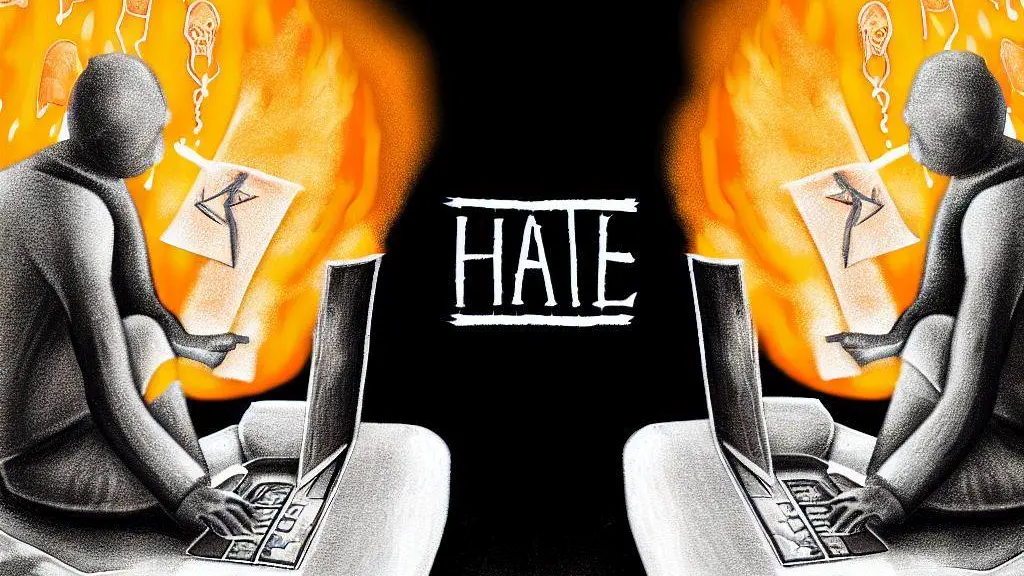 illustration: bing.com/create
illustration: bing.com/create- Among older adults (55–65 years old), this proportion is relatively low at (19%)
- Among younger people, the majority have already encountered hate, with 60% aged 18–24
- and 50% of Polish internet users aged 25–34.
- Hate is hate speech. It includes harmful judgments and negative opinions that appear massively, not only online. We also encounter hate in everyday life, in public life, but it’s most prevalent online. Schools, for example, are a breeding ground for hate - says Janusz Sielicki, partner at IRCenter, in an interview with Newseria Biznes. - Younger people are more active online, participate more often, and are also more sensitive. Unfortunately, herd mentality often takes effect here; we choose a target, and everyone attacks them. Hate also intensifies when someone reacts, and seeing the victim suffer fuels further attacks.
For the youngest users, who are most exposed to hate, we have even more detailed data. The NASK report "Teens 3.0" estimates that up to 75 percent of Polish students have encountered cyberbullying. Like in the real world, online hate mainly concerns:
- social views (38%),
- appearance (35%),
- political views (30%),
- hobbies and interests (24%).
- Even having certain interests can be the target of hate. Relatively less often mentioned are factors like sexual orientation, age, gender, or disability, which is because those who engage in hate usually choose a weaker target - explains Janusz Sielicki, quoted by Newseria Biznes. - If you are a white, healthy, adult male or female, the likelihood of being a hate victim is much lower. That’s why youth are the most at risk.
Increasing awareness, persistent passivity
The IRCenter study also examined the knowledge and awareness of Polish internet users regarding the dangers and consequences of online hate.
- 77% of respondents heard of cases where hateful comments had a negative impact on their targets;
- over 60% witnessed someone receiving offensive comments online;
- nearly 90% of respondents believe hateful comments are too frequent on the internet.
Despite this awareness and an almost unanimous judgment of the issue, there is a lack of knowledge on how to react when witnessing cyberbullying. While 78% believe that hate and hate speech are issues that must be fought, the majority do not or do not want to participate actively in this fight.
- More than half (58%) do nothing,
- one in three reports hate to site administrators,
- only one in five (19%) defends the hate victim.
- We fear that if we stand up for someone, we’ll get the same label and become the target of the same wave of hate as the person we’re trying to defend - explains Janusz Sielicki. - And it’s not easy, as hate appears suddenly, like a tidal wave, from nowhere, and within a few hours, it floods us and can destroy the psyche of the person targeted.
Types and techniques of haters
Dr. Paweł Trzaskowski, head of the language section at Polish Radio, analyzed hate in online comments. The researcher identified and described mechanisms of harm in comments. In terms of discrediting techniques used in hate speech, we can distinguish:
- mockery (ridiculing a person, making fun of their traits),
- deprecation (insults, slurs),
- labeling (assigning a person to a single, negatively associated category),
- distraction (referring to topics entirely unrelated to the issue),
- and also provocation (e.g., attacking sensitive points such as intimacy or family).
Dr. Trzaskowski also distinguishes several types of haters:
- "jokers" (aim to cause laughter),
- "shouters" (use short, often vulgar statements),
- "indignant" (express their dissatisfaction),
- "informants" (share knowledge with others).
While hate speech varies in language, with commentators using all available linguistic means to discredit opponents, hate techniques are repetitive and easy to identify. Once they are known, it’s easy to predict what the comment section under an article will look like.
COMMERCIAL BREAK
New articles in section Law in media
Dietary supplement ads in Poland. Who keeps influencers in check?
Newseria, KFi
One in three Polish internet users considers influencer recommendations when deciding on medicines and dietary supplements. Although promotion of such products is regulated, there are still cases of advertising that skirt the law.
SEO Poisoning. Hackers Use Search Engines to Target Businesses
Piotr Rozmiarek
Search engines help us quickly find information, but they can also be used by cybercriminals. SEO poisoning is a tactic where attackers manipulate search engine rankings to place harmful websites at the top of search results.
Phishing in the Cryptocurrency Industry. Fake Recruitments Steal Data
Piotr Rozmiarek
Security researchers have detected a social engineering campaign targeting job seekers in the Web3 industry. The attack aims to conduct fake job interviews via a meeting application that installs information-stealing malware.
See articles on a similar topic:
How to Detect Pegasus on Your Phone and Protect Against Spying
RINF
The nature of spyware is to remain as hidden as possible, making it difficult to detect on a device. However, some mechanisms can help verify if a smartphone has been compromised.
Local Media in Poland - Announcements
Bartłomiej Dwornik
Research by ComPress Agency, conducted among journalists in 2001, indicates that only 7 percent of them believe that PR specialists and press spokespeople understand journalists' needs well.
Local Media in Poland - Court Cases
Bartłomiej Dwornik
Investigative journalists in local newsrooms often remain in the shadow of their colleagues from national outlets, despite frequently being the first to uncover a scandal.
Cyber Attack on a Corporate Smartphone. How to Protect Yourself
KrzysztoF
Internet-connected mobile devices are an attractive target for cybercriminals. The key to protecting sensitive business data is employee awareness, hardware solutions, and appropriate software. This mini-guide provides a quick overview of how to protect each of these areas.






























